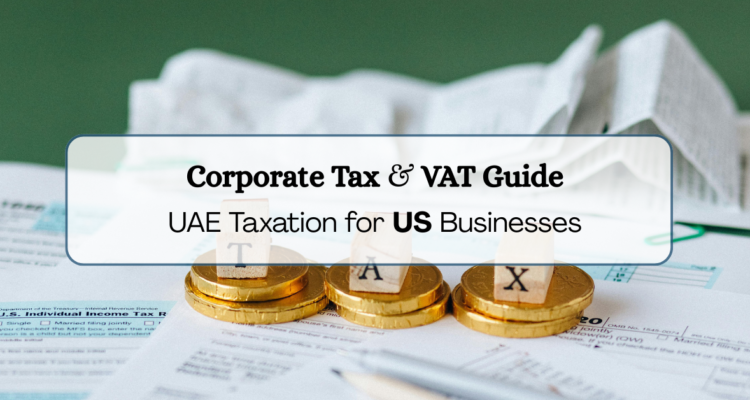The United Arab Emirates (UAE) is an attractive destination for UK entrepreneurs, offering a strategic…

Understanding UAE’s Taxation System: Key Insights for US Business Owners
The United Arab Emirates (UAE) is a global business hub, renowned for its strategic location, modern infrastructure, and attractive tax environment.
For US business owners looking to expand into the UAE, understanding the country’s taxation system is essential for compliance and financial optimization.
With the introduction of corporate tax in 2023 and a well-established Value Added Tax (VAT) system, navigating UAE tax regulations requires careful planning. At Global Business Konsultancy, we provide expert guidance to ensure US businesses thrive in the UAE.
Overview of the UAE Taxation System
The UAE’s taxation system is designed to be business-friendly, balancing low tax rates with incentives to attract foreign investment. Key components include:
- Corporate Tax (CT): Introduced under Federal Decree-Law No. 47 of 2022, effective for financial years starting on or after June 1, 2023.
- Value Added Tax (VAT): Implemented in 2018 at a standard rate of 5%.
- Excise Tax: Applied to specific goods like tobacco, energy drinks, and carbonated beverages.
- No Personal Income Tax: The UAE does not levy income tax on individuals, making it attractive for expatriate business owners and employees.
For US business owners, the interplay between UAE and US tax obligations, including IRS reporting requirements, is critical to avoid double taxation and ensure compliance.
Corporate Tax: Key Details for US Business Owners
Tax Rate and Scope
- Rate: 9% on taxable income exceeding AED 375,000 (approximately USD 102,000).
- Applicability: Applies to all businesses in the UAE, including mainland, free zone, and offshore entities with a permanent establishment (PE).
- Exemptions:
- Qualifying Free Zone Persons: Free zone businesses meeting specific criteria (e.g., adequate substance, qualifying activities like export or trading within free zones) enjoy a 0% CT rate on qualifying income.
- Natural Resource Extraction: Subject to emirate-level taxation, not federal CT.
- Small Business Relief: Businesses with revenue below AED 3 million may qualify for exemptions (subject to conditions).
Taxable Income
Taxable income includes profits from business activities, adjusted for:
- Allowable Deductions: Operational expenses, depreciation, and R&D costs.
- Non-Deductible Expenses: Fines, bribes, and personal expenses.
- Loss Carryforward: Losses can offset future taxable income for up to 7 years.
Registration and Compliance
- Registration: Mandatory for all taxable entities via the Federal Tax Authority’s (FTA) EmaraTax portal (www.tax.gov.ae). Required documents include business licenses, financial statements, and shareholder details.
- Filing: Tax returns must be filed within 9 months of the financial year-end, with payments due concurrently.
- Audits: Maintain audited financial records for 7 years, adhering to International Financial Reporting Standards (IFRS).
Value Added Tax (VAT): What US Business Owners Need to Know
VAT Basics
- Rate: 5% standard rate, with 0% for exports and certain services (e.g., international transportation).
- Threshold: Businesses with annual taxable supplies exceeding AED 375,000 must register for VAT. Voluntary registration is available for supplies above AED 187,500.
- Scope: Applies to goods and services supplied in the UAE, including imports.
Compliance Requirements
- Registration: Apply through the FTA portal, obtaining a Tax Registration Number (TRN).
- Invoicing: Issue tax invoices for all taxable supplies, ensuring compliance with FTA formats.
- Filing: Submit VAT returns quarterly or monthly, depending on revenue, and settle liabilities within 28 days of the period’s end.
Impact on US Businesses
- Input Tax Recovery: Recover VAT paid on business-related expenses (e.g., office supplies, utilities) if registered.
- Cross-Border Transactions: Exports to the US are zero-rated, but imports into the UAE incur 5% VAT, payable at customs.
Excise Tax and Other Considerations
- Excise Tax: Levied on specific goods (e.g., 100% on tobacco, 50% on carbonated drinks). US businesses in these sectors must register and file returns.
- Customs Duties: Most imports face a 5% duty, though free zones offer exemptions for re-exported goods.
- Transfer Pricing: Related-party transactions must comply with arm’s-length principles, requiring documentation to avoid penalties.
US-UAE Tax Treaty and Cross-Border Considerations
The UAE and US have a double taxation agreement (DTA) to prevent dual taxation. Key benefits include:
- Tax Credits: Taxes paid in the UAE can offset US tax liabilities, subject to IRS rules.
- Withholding Tax Relief: Reduced or zero withholding tax on dividends, interest, and royalties (per treaty terms).
- IRS Reporting: US business owners must comply with Foreign Account Tax Compliance Act (FATCA) and Foreign Bank Account Reporting (FBAR) requirements for UAE accounts.
Strategic Tax Planning for US Business Owners
- Choose the Right Setup:
- Free Zone: Ideal for tax exemptions on qualifying income, suitable for export-oriented or tech businesses.
- Mainland: Necessary for local market access, with 9% CT on taxable income.
- Offshore: Best for holding companies or international trading without a UAE physical presence.
- Leverage Free Zone Benefits: Ensure compliance with substance requirements (e.g., local office, employees) to maintain 0% CT eligibility.
- Optimize Deductions: Maximize allowable expenses, such as startup costs and employee salaries, to reduce taxable income.
- Plan for VAT: Register promptly if your revenue exceeds the threshold and recover input VAT to improve cash flow.
- Engage Experts: Partner with Global Business Konsultancy for tailored tax strategies, registration, and compliance support.
Common Challenges and Solutions
- Challenge: Managing dual tax jurisdictions.
- Solution: Work with a consultant like Global Business Konsultancy to harmonize UAE and US tax compliance.
- Challenge: Understanding free zone tax exemptions.
- Solution: Conduct a detailed activity review to confirm eligibility for 0% CT.
- Challenge: Maintaining audit-ready records.
- Solution: Implement IFRS-compliant accounting systems and conduct regular audits.
Why Choose Global Business Konsultancy for Tax Guidance?
At Global Business Konsultancy, we simplify the UAE’s taxation system for US business owners:
- Comprehensive Support: From corporate tax registration to VAT compliance.
- Cross-Border Expertise: Aligning UAE tax obligations with US IRS requirements.
- Tailored Solutions: Strategic planning to minimize tax liabilities and ensure compliance.
Our team’s in-depth knowledge of UAE tax laws and international business ensures a seamless experience for your expansion.
Conclusion
The UAE’s taxation system offers significant opportunities for US business owners, with low corporate tax rates, VAT recovery, and free zone incentives. By understanding corporate tax, VAT, and cross-border obligations, you can position your business for success. Partner with Global Business Konsultancy to navigate the UAE’s tax landscape with confidence and focus on growing your business in this dynamic market.
Ready to master UAE taxation for your US business? Contact Global Business Konsultancy for expert tax advisory and compliance services.




